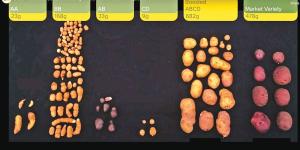Boosted Breeding Yields Better Potatoes
 ✖  |
Ohalo Genetics is prepared to change the way potatoes are planted. No more cutting whole potatoes into pieces to be planted. Instead, potato fields will be planted with seed, like nearly every other major food crop. Costs will be lower, and yield increases of 100 percent or more appear possible, not just for potatoes. The company calls this concept “Boosted Breeding” and plans to apply it to all major crops.
Until now, planting a potato seed was like planting an apple seed. The seed carried all the genes of parent plants with no guarantee of what would result. Plant 50 potato seeds from a single large, white Russet potato plant and harvested potatoes could be any size or color, not to mention other features.
Ohalo claims the ability to cross two potato plants and produce polyploid potato seed that contains both parents’ beneficial traits. Not only are all the progeny alike, but Ohalo claims they produce significantly higher yields. The hybrid plant is more vigorous, healthier, and grows bigger and faster.
In a recent episode of the All-In Podcast, Ohalo CEO David Friedberg claimed yield increases with some plants of 60 to 100 percent or more. “We’ve seen incredible yield gains in potatoes almost overnight,” he says.
Switching to genetically identical seed instead of planting potato pieces could reduce grower costs by 20 percent. In addition, Ohalo is looking at producing potatoes with desirable levels of nutrients and sugars.
Ohalo isn’t limiting itself and its technology to potatoes. Cross any two plants, and the resulting hybrid has half the genes of each parent. It’s a gamble on which genes are passed on and which aren’t. With Boosted Breeding, all the beneficial traits from both are passed on. Ohalo’s technology can select the desired traits.
“We’re going to be applying this boosting technology across nearly every major crop worldwide,” says Friedberg. “It’ll increase yield, but it’ll also have a massive impact on the ability to deliver seeds, help farmers, and lower food prices.”
Contact: FARM SHOW Followup, Ohalo Genetics, Mills River, N.C. (hello@ohalo.com; www.ohalo.com).

Click here to download page story appeared in.
Click here to read entire issue
Boosted Breeding Yields Better Potatoes CROPS New Techniques Ohalo Genetics is prepared to change the way potatoes are planted No more cutting whole potatoes into pieces to be planted Instead potato fields will be planted with seed like nearly every other major food crop Costs will be lower and yield increases of 100 percent or more appear possible not just for potatoes The company calls this concept “Boosted Breeding” and plans to apply it to all major crops Until now planting a potato seed was like planting an apple seed The seed carried all the genes of parent plants with no guarantee of what would result Plant 50 potato seeds from a single large white Russet potato plant and harvested potatoes could be any size or color not to mention other features Ohalo claims the ability to cross two potato plants and produce polyploid potato seed that contains both parents’ beneficial traits Not only are all the progeny alike but Ohalo claims they produce significantly higher yields The hybrid plant is more vigorous healthier and grows bigger and faster In a recent episode of the All-In Podcast Ohalo CEO David Friedberg claimed yield increases with some plants of 60 to 100 percent or more “We’ve seen incredible yield gains in potatoes almost overnight ” he says Switching to genetically identical seed instead of planting potato pieces could reduce grower costs by 20 percent In addition Ohalo is looking at producing potatoes with desirable levels of nutrients and sugars Ohalo isn’t limiting itself and its technology to potatoes Cross any two plants and the resulting hybrid has half the genes of each parent It’s a gamble on which genes are passed on and which aren’t With Boosted Breeding all the beneficial traits from both are passed on Ohalo’s technology can select the desired traits “We’re going to be applying this boosting technology across nearly every major crop worldwide ” says Friedberg “It’ll increase yield but it’ll also have a massive impact on the ability to deliver seeds help farmers and lower food prices ” Contact: FARM SHOW Followup Ohalo Genetics Mills River N C hello@ohalo com; www ohalo com
To read the rest of this story, download this issue below or click
here to register with your account number.







